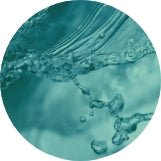Water Tests
What Kind Of Water Do You Have?
If you live in a suburban or rural area, your drinking water might be affected by pollutants. Make sure you know how clean your water is with our Well Water Test Kit. It has everything you need to identify abnormalities in your drinking water like bacteria, lead, pesticides, iron, and other contaminants that could impact your health.
How it Works
1. Collect a water sample
By following the instructions in our kit, collect a sample by filling a few bottles with water and completing out a short form.
Additional sampling instructions2. Ship it to our laboratory
Return your kit to our laboratory using the required delivery method provided on the instructions, or drop off the kit if you are in the neighborhood.
3. Receive your in-depth report
We'll give you an easy-to-read report that has all of your results compared side-by-side with National EPA Standards.
View a sample report!Why You Should Test Your Tap Water
There are various ways to gauge whether your water needs to be tested. If your drinking water's color, taste, or smell is becoming noticeable, it's time to test. Ignoring symptoms of contamination can lead to health issues and even disease.

Color
Discolored water is often a red flag to homeowners that their water may be unsafe. Yellow, brown, red, or orange signifies rust, iron, or oxygen in your tap water. Organic compounds can also impact the color of the water.
Learn more about discolored waterTaste
If you notice a chlorine or metallic taste, testing can help you pinpoint the source. Metallic tasting water could indicate that your pipes are beginning to deteriorate. Chlorine is a common chemical used in water to prevent disease. However, if the chlorine levels are too high, the chlorine levels might be too high.
Learn more about other issues that impact your drinking water's tasteSmell
Odors coming from your sinks are almost impossible to ignore. The smell of rotten eggs or sulfur is the most common and could indicate bacterial growth. Sulfur odors are most common in homes with private wells and are a sign of organic compounds decaying. While sulfur bacteria is not harmful, sulfide gas and coliform bacteria could pose a health concern. Coliform bacteria and nitrate are contaminants that could cause significant health issues. To be safe, it's essential to get your water tested and seek proper treatment.
Learn about other common odors that can come from your tap





